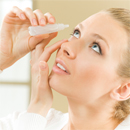

 Tears give you good vision, protect your eyes from irritants and keep them healthy. Crying your eyes out can actually be good. Dry eyes on the other hand, make it more difficult to perform some activities, can cause damage to your corneas and decrease your vision. While dry eyes may not sound like a serious health issue, eye specialists warn that in some cases it can lead to infection, scarring or an ulcer, which can permanently damage vision.
Tears give you good vision, protect your eyes from irritants and keep them healthy. Crying your eyes out can actually be good. Dry eyes on the other hand, make it more difficult to perform some activities, can cause damage to your corneas and decrease your vision. While dry eyes may not sound like a serious health issue, eye specialists warn that in some cases it can lead to infection, scarring or an ulcer, which can permanently damage vision.
Tears are not just for crying, they are important to the function of our eyes. When our eyes don’t produce enough tears our eye health is put in jeopardy. Most of us get dry eyes from time-to-time, but when it happens on a regular basis we have to pay really close attention. If you have dry eyes you will feel it right away. The symptoms include pain, itching, burning or a gritty feeling in one or both eyes. Some people experience redness and in severe cases blurred vision. People have even reported feeling as if they have a foreign object, such as sand, in their eyes.
The cornea, which is the translucent surface of the eye that covers the iris and the pupil, protects those all important eyesight mechanisms from contaminants. People with chronic dry eyes have to be very careful because every time they blink, they could be scratching the corneas and causing loss of vision. Dry eye treatment is crucial to help maintain eye health and good vision.
Dry eyes are one of the most common problems older men and women face. As we age, our eyes tend to become more sensitive to things like wind and light. This is because our body’s mucous membranes produce fewer secretions. Having said this, it is important to know that we can face dry eyes at any age.
 When you have dry eyes, there is one of two situations at work – either not enough tears are being produced, or the quality of the tears you are producing is just not sufficient enough to protect your corneas. There are a number of reasons why you might not have enough tears or low quality tears.
When you have dry eyes, there is one of two situations at work – either not enough tears are being produced, or the quality of the tears you are producing is just not sufficient enough to protect your corneas. There are a number of reasons why you might not have enough tears or low quality tears.
Here’s a look at some of the causes of dry eyes:
People who suffer from chronic dry eyes are often told they have dry eye syndrome. Women who go through hormonal changes, particularly associated with menopause, have a high rate of dry eyes. Some theories suggest that a decline in the hormone androgen could be the cause.
For many people dry eyes can cause mild irritation or occasional difficulty with reading for extended periods of time; however, for others it can lead to blurred vision and low vision. People with chronic dry eyes can find the condition life changing. It can decrease the amount of leisure time a person enjoys, it can lead to depression, interfere with work and lower a person’s self-esteem.
 There are several possible options for treatment of dry eyes. While many people use artificial teardrops, they are known to have preservatives in them and, if used too often, can in fact damage your eyes. If you fall into the chronic category, natural dry eye remedies are best. For instance, preservative-free eye drops are safer. Ointments can also be dropped in your eye, but they have a thick consistency and can make it difficult to see, so they should only be applied at night when you are going to bed.
There are several possible options for treatment of dry eyes. While many people use artificial teardrops, they are known to have preservatives in them and, if used too often, can in fact damage your eyes. If you fall into the chronic category, natural dry eye remedies are best. For instance, preservative-free eye drops are safer. Ointments can also be dropped in your eye, but they have a thick consistency and can make it difficult to see, so they should only be applied at night when you are going to bed.
Natural dry eye remedies are not only safe, but in many cases, they are the most effective. For example, water is just one part of what makes up our tears. Oil, mucous and proteins are also in our tears. Here are a few natural remedies to help treat your dry eyes:
For most people having dry eyes is a temporary nuisance; however, when it goes on for a long time it can be a sign of a bigger problem, and you should take it seriously and treat your eyes properly. As the saying goes, our eyes are our “window to the world” and who wants to close that window?
Copyright © www.orthopaedics.win Bone Health All Rights Reserved